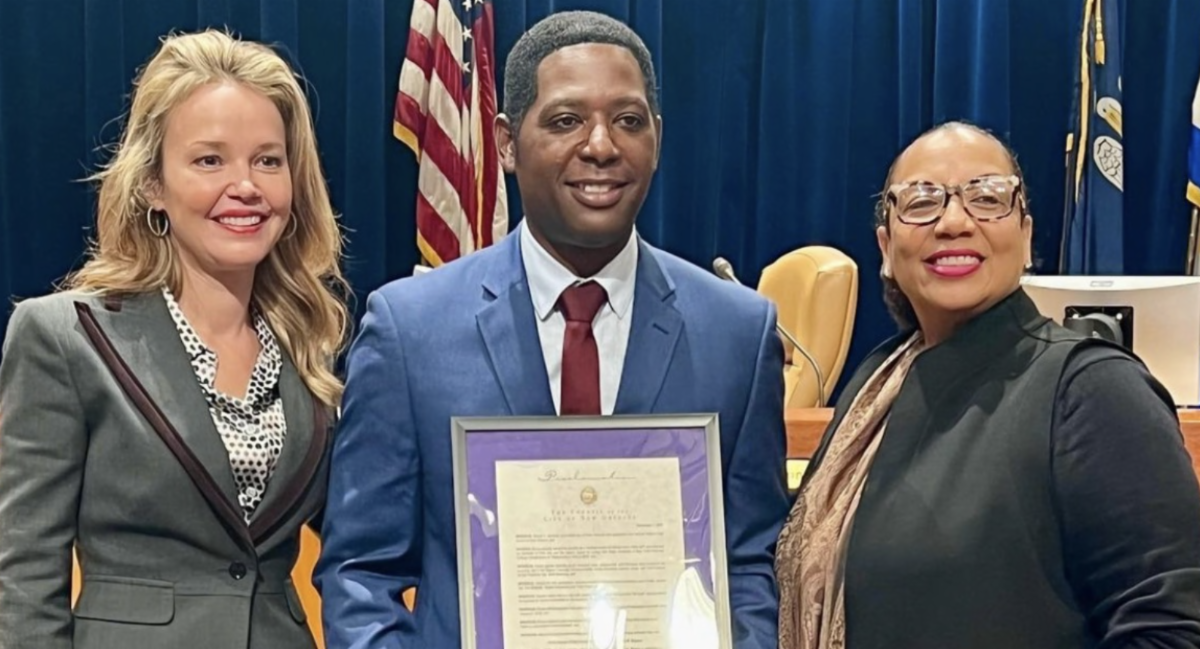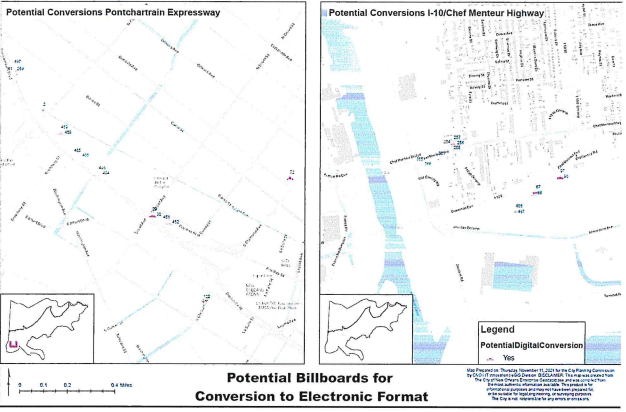Regular Meeting
December 01, 2021 10:00 AM
City Council Chamber
View Agenda (PDF)
View Agenda (MS Word)
View completed agenda
Submit Public Comment
View agenda with attachments
NEW ORLEANS - During its regular meeting yesterday, the New Orleans City Council adopted 2022 Operating and Capital Budgets, approved items to ensure public participation in any proposed plans to move City Hall, and established a new interim zoning district and cultural protections in Tremé.
Additionally, the Council approved federal funding allocated for sewer replacement work, revisions to the 2019 Billboard Study, proposed amendments to the Classified Pay Plan to increase the salaries of certain City jobs, and a motion to increase citywide housing opportunities.

Council President Moreno and Vice President Glapion presenting a proclamation to New Orleans native and actor Royce Johnson before the start of yesterday's meeting
Adoption of 2022 City Budget
The Council adopted the City’s Capital and Operating Budgets for 2022, which include several notable accomplishments from wage increases, right to counsel, domestic violence protections, and more.
Council President Helena Moreno issued a statement in response to next year's budget, saying, “I’m proud of the work this Council has done to advance opportunity, equity, and public safety. We’re raising public employee salaries to at least a living wage of $15; fully funding the right to counsel for those facing evictions and housing insecurity; ensuring enhanced protections for domestic violence victim services; creating an advocacy agency for our culture bearers and cultural community; and building a cleaner, greener New Orleans.”
The 2022 budget items approved by the Council include:
“Yet, there’s so much more to do,” Councilmember Moreno continued. “We need to build stronger accountability and responsiveness throughout government and build out a full-spectrum approach to the challenges of climate change. I’m thankful for the work of our Council budget staff, the Administration, and all of the members of the community who engaged with the process along the way.”
More Inclusivity and Public Input Embedded in City Hall Relocation Process
In light of the concerns expressed by residents and community organizations over the past year, the Council approved three items during yesterday's meeting (ZD 83/21 & M-21-436) to create a new use definition and zoning district use permissions for a "City Hall" and ensure that all future plans for a proposed move incorporate significant community engagement.
More specifically, these items accomplish the following:
- Create a new use definition in Article 26 of the Comprehensive Zoning Ordinance (CZO) for a “City Hall,” that reads: “A building or a complex of adjacent buildings that operates at the central hub of municipal government, including the office of the Mayor, the offices of the City Council, the customary meeting place of the governing authority, and the operations of a significant number of executive branch departments and Charter established boards and commissions.”
- Amend the use tables in all zoning districts to provide “City Hall” as an Institutional Use, granted by a conditional use in certain zoning districts; and
- Require that any “City Hall” conditional use, regardless of the applicant and including those initiated by the Council or City, must include a project Neighborhood Participation Program (NPP).
Motion M-21-436 prohibits the use of a City Hall in the Parkland and Open Space FLUM categories where it is currently permitted, citing these uses should clearly be confined to parks, open space, recreation, arts, culture, horticulture, and stormwater management. While there are several City departments and offices with missions involving those uses which may be appropriate, that cannot be said about the mission of all City departments and offices. Given that these are regional open space districts with large parks intended to draw visitors from across the region, neither are appropriate places for City Hall, and therefore, it should not be a permitted use within their boundaries.
Currently, the executive branch has unique and unilateral control over the City Hall relocation process, which no single entity should be authorized to dictate. The Council has and will continue to state its position on the matter, asserting it is absolutely essential that members of the community have a central role in where their government is based. With these measures, it hopes to provide an inclusive and accessible conditional use process moving forward with mandatory Council approval subject to the same community-centric approach utilized for all other land-use decisions, ensuring the necessary checks and balances are in place before breaking ground on such a significant and transformational project.
“We want to thank and acknowledge the commitment of this Council in hearing our community and maintaining your commitment to us,” said a spokesperson for the Save Our Soul Coalition prior to the vote. “We too, remain committed and will see this through to the end. This needs to happen, and it needs to happen quickly, but it must be done professionally, courteously, and inclusively, and this is a great step in the right direction.”
New Zoning District and Requirements to Preserve the Cultural Integrity of Tremé
The Council voted in favor of three items (ZD 75/21, M-21-431 & M-21-366) designed to protect the unique and rich cultural identities of the Tremé neighborhood. Zoning Docket ZD 75/21 and Motion M-21-431 establish a new Protect Tremé Interim Zoning District (IZD) to prohibit certain uses and to protect the Tremé community from uses detrimental to its historic structures and culture until a comprehensive vision for the future of Tremé, specifically Louis Armstrong Park, is developed by its residents in collaboration with the City.
Motion M-21-366 explicitly prevents any government office, public works/safety facility, or City Hall within the boundaries of Louis Armstrong Park and Congo Square, establishing its past and present uses as a historic locale for community gathering and conduit for the retention of African culture and spiritual practices. It is imperative to prohibit government operations and facilities within New Orleans’ cultural meccas like Louis Armstrong Park to safeguard surrounding neighborhoods.
As outlined in the motion, the Council directs the City to stabilize, secure, and prevent further deterioration of the Municipal Auditorium while it explores other, more culturally-appropriate locations.
Council Authorizes Agreement to Facilitate Sewer Replacement Projects
With its passage of Ordinance 33,554, the Council approved a five-year Cooperative Endeavor Agreement (CEA) between the City and Sewerage and Water Board (S&WB) to conduct sewer replacement work and other capital improvements with funding from the U.S. Environmental Protection Agency’s (EDA) Water Infrastructure Finance and Innovation Act program.
The Council remains committed to working with local partners from the City, S&WB, and throughout the community to continue to identify solutions and improve the ways in which New Orleans deals with water to promote long-term sustainability for generations to come.
Council Looks to Increase Minimum Salaries for Certain Classified Employees
Newly-passed Ordinance 33,528 requires the Department of City Civil Service to evaluate and provide recommendations to the Civil Service Commission and the Council relative to increasing the minimum annual salary of certain categories of government employees.
The proposed legislation would result in increases for the “Police Technical Specialist,” “Police Technician,” “Criminalist,” and “DNA Analyst” job series to market rate and ensure that police personnel working in the Scientific Criminal Investigations Section of the Crime Lab and Evidence Division are more adequately compensated.
The Council set a deadline of January 3, 2022, for the Department of City Civil Service to deliver its final report and recommendations on the matter.
CPC to Consider Zoning Amendments to Increase Housing Stock
The Council has directed the CPC to hold a public hearing to consider amending or modifying certain use standards to increase housing opportunities citywide. Motion M-21-435 asks CPC staff to consider creating definitions and standards for an “accessory dwelling unit” in addition to potential modifications relative to the current definition and standards for an “accessory structure” to provide for new construction of accessory dwelling units and/or the conversion of existing structures for long-term residential use.
As part of its study, the CPC will also consider the addition of such use tables in appropriate districts, establishing site design standards, and making recommendations for any other amendments they may deem necessary to combat the current affordable housing crisis.
Additional Billboard Recommendations and Guidelines
The Council passed two items (ZD 64/21 & M-21-426) authorizing a requested text amendment to incorporate certain recommendations and initiatives contained in the 2019 Billboard Study.
Zoning Docket 64/21 outlines several changes to the CZO, specifically, to implement recommendation “Option 2: To provide ‘trade’ incentives allowing nonconforming billboards to digitize in exchange for removal” along with the following additional considerations:
- Conversion of billboards with two sides/faces;
- Conversion of billboards out of residential and historic districts;
- Protections to ensure that there will not be a concentration of digitized billboards in one location/area of the city;
- Illumination standards; and
- Density standards.
With the goal of reducing the total number of legal nonconforming billboards in the city, the CPC continues to support a trade system as recommended in its initial Billboard Study, as it would allow for the conversion from static to electronic billboards at certain appropriate locations not oriented towards residential uses and with minimal to no impact on only commercial and industrial properties.
The conversions will be handled administratively in the future by identifying the appropriate locations through this text amendment. The recommended trade system also establishes a value for the billboards to be removed that meets or exceeds the highest end of best practices identified in the Billboard Study in terms of benefits to the citizens of New Orleans.

Media Contact:
Paul Harang
Chief of Staff
(504) 658-1101
Paul.Harang@nola.gov
New Orleans City Council